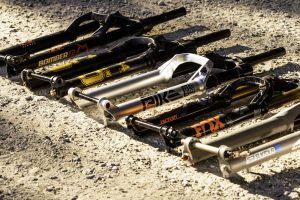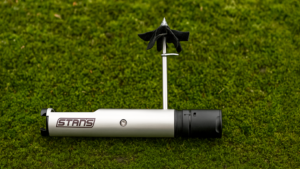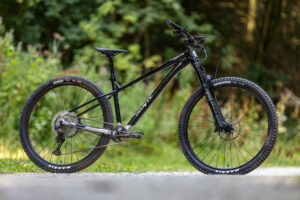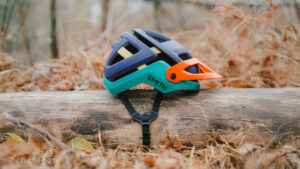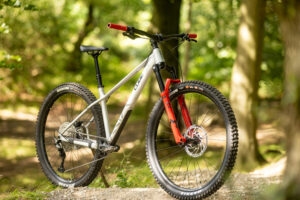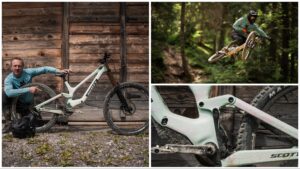Getting the best mountain bike wheels can totally transform your ride – it's one of the most effective upgrades out there.
The best mountain bike wheels can take more of a hammering than ever. You can also choose between light weight for maximum speed and efficiency, ultimate strength for durability, compliant wheels for comfort, or stiff wheels for responsiveness. We’ve narrowed down the options to make your life easier.
Wheels are just part of the system; make sure you’ve got the best mountain bike tyres for the conditions you’re riding in, and good mud tyres if you’re looking for extra grip in the winter.
Best mountain bike wheels – quick list
- Best overall wheels – Crankbrothers Synthesis
- Best budget wheels – Hunt Wheels Trail Wide
- Best lightweight wheels – Silt Carbon XC
Trail/Enduro wheels

The Crankbrothers Synthesis E11 wheels are special hoops.
1. Crankbrothers Synthesis E11
Best carbon trail wheels for overall ride quality
Weight: 860g front, 1,020g rear | Material: Carbon | Internal rim width: 31.5mm front, 29.5mm rear | Rating:10/10
Reasons to buy:
- A special product that dos what it sets out to do
- Noticeably more grip on severe terrain
Reasons to avoid:
- Relatively expensive
- Not for weight weenies
For its Synthesis wheels, Crankbrothers looked at what was required from a front wheel and a rear wheel, and optimised every element of each wheel for its specific task. So that translates into more comfort, grip, and compliance up front, allied to a stiffer, stronger rear wheel that transfers power efficiently and stood up to all the abuse we could throw at it. Calm and composed, yet seriously rapid, the Synthesis carbon wheels are our favourite options for all-round performance.
Read our test of Crankbrothers Synthesis E wheelset

As an affordable upgrade, nothing really beats Hunt’s Wheels Trail Wide wheels.
2. Hunt Wheels Trail Wide
Best budget trail wheels
Weight: 810g front, 990g rear | Material: Alloy | Internal rim width: 30mm | Rating: 10/10
Reasons to buy:
- Lighter and faster than most
- Not much heavier than lots of carbon wheels
- Excellent value for money
Reasons to avoid:
- Direct sales only
- Not the most comfortable wheels
Hunt’s direct-sales wheel range brings top performance at down-to-earth prices. The rims are seriously tough, roll fast, and the freehubs engage rapidly, so acceleration is almost instantaneous. In the box you get spare spokes, tubeless valves, and a spoke key, so you can get set-up and hit the trails straightaway. While not the most compliant or comfortable of wheels, the Hunt Trail Wides make up for this with excellent strength, decent weight, and a sorted package at a bargain price.
Read our test of the Hunt Wheels TrailWide wheelset

Zipp’s 3Zero Moto is a unique product that excels on natural enduro terrain.
3. Zipp 3Zero Moto
Best wheels for off-camber grip
Weight: 891g front, 1,019g rear | Material: Carbon | Internal rim width: 30mm | Rating: 9/10
Reasons to buy:
- Simply amazing rims
- Grip is off-the-charts
Reasons to avoid:
- Hefty price tag
- Not suitable for heavy riders
- Don’t buy if you want to schralp berms and regularly burp tyres in corners
Zipp’s single-wall carbon rim is the most impressive wheel-related product we’ve tried in years. Maybe even decades. It’s engineered to flex locally around the spoke bed, so the rim and tyre can better conform to the ground. And the design works. The amount of off-camber grip is absurd – it feels like cheating. However, the rims are not exactly light, not exactly cheap, and don’t suit heavy riders or those that generate high cornering forces. But for natural enduro trails they are sublime.
Read our test of Zipp 3Zero Moto wheelset

The DT Swiss M1900 wheels are burly but bombproof.
4. DT Swiss M1900
Best budget wheels for reliability
Weight: 950g front, 1,060g rear | Material: Alloy | Internal rim width: 30mm | Rating: 9/10
Reasons to buy:
- Really smooth ride feel
- Sorted hub internals
- No weird construction
Reasons to avoid:
- Heavy
Toughness and reliability are the main selling points with DT Swiss’ M1900 wheels, and this bombproof package does the job for a fair price. You’ll need to spend considerably more, and reach much higher up the DT range, to save weight, but lighter wheels are available for a similar price from brands such as Hunt. That said, you will be able to get spares and replacement spokes for a DT wheel pretty much anywhere in the world, and that’s something worth considering.
Read our test of DT Swiss M1900 Spline wheelset

5. Mavic E-Deemax S wheels
Best electric mountain bike wheels
Weight: 1,030g front S30, 1,150g rear S35 | Material: Alloy | Internal rim width: 35mm | Freehub: XD driver, Microspline or HG | Rating: 9/10
Reasons to buy:
- Easy to set-up tubeless
- Strong rims
- Durable
- Low-friction freehub
- Good quality
Reasons to avoid:
- Heavy
- Standard graphics are a bit naff
As the name suggests, the E-Deemax is aimed at hard-hitting e-bikers looking for peace-of-mind. You can get them in either 29in or 27.5in diameters, with two different widths (30mm and 35mm), so it’s easy to mix and match. In terms of stiffness, they are middle of the road, but the freehub is super-fast rolling, so you seem to roll effortlessly and they may even help boost battery range a little. The other main benefit with Mavic wheels like the E-Deemax is that they don’t need rim tape, so they tend to be really easy to set-up tubeless. Not a wheel for weight weenies, but the E-Deemax is solid, reliable, and easy to set-up.
Read the full review of the Mavic E-Deemax wheels

The Mavic Crossmax XL wheels are well-made and reliable.
6. Mavic Crossmax XL wheels
Best wheels for easy tubeless tyre set-up
Weight: 964g front, 1,109g rear | Material: Alloy | Internal rim width: 30mm | Freehub: XD driver, Microspline or HG | Rating: 9/10
Reasons to buy:
- Durable internals
- Mix and match wheel sizes
- Tough
- Easy to run tubeless
Reasons to avoid:
- Freehub engagement is laggy
- Bladed spokes can feel twangy when pushed
This is Mavic’s budget wheelset and it’s built around a 30mm rim with no spoke drillings, so you don’t need rim tape to set them up tubeless. This takes a load of faff out of the procedure, and is one of Mavic’s big selling points. It’s also built tough, although there is a weight penalty on the scales. The Crossmax XL won’t transform the ride quality of your bike, but it will outperform and outlast the no-name wheels on a budget bike, which makes it a smart upgrade for a lot of riders.
Read the full review of the Mavic Crossmax XL wheels

Stan’s No Tubes Flow EX3 have the build quality needed for punishment duty.
7. Stan’s No Tubes Flow EX3
Best wheels for heavier and/or enduro riders
Weight: 1,000g front, 1,145g rear | Material: Alloy | Internal rim width: 29mm | Rating: 9/10
Reasons to buy:
- Heavy duty wheels for serious enduro riding or bigger riders
Reasons to avoid:
- Perhaps overkill for smaller, lighter, smoother riders
Built tough, Stan’s No Tubes Flow EX3 wheels come in at over 2kg on the scales. That’s extra weight that has to be hauled uphill, accelerated, braked, and picked up when changing direction. So it comes as a surprise that they actually ride lighter than the numbers suggest. We wouldn’t choose them for a trail or down-country bike, but for big riders on long-travel enduro bikes, they are a smart choice.
Read our test of the Stan’s No Tubes Flow EX3 wheelset

Silt All-Mountain’s are tough and pretty light.
8. Silt All-Mountain
Don’t just go by the All-Mountain tag, these are impressively light
Weight: 1,890g pair | Material: Alloy | Internal rim width: 30mm | Rating: 9/10
Reasons to buy:
- Pretty much unmatched in terms of weight and strength at this price
Reasons to avoid:
- Not a lot for the money
Silt’s another new brand with a direct-sales wheel business. We’ve tested a couple of its products and been impressed on both occasions. These All-Mountain alloy wheels are competitive in terms of both weight and price, and the ride quality is snappy and positive. The low mass means they change direction quickly and respond immediately. Despite our best efforts, we’ve barely managed to put a scratch on them, too, so durability is impressive.
Read our test of the Silt All-Mountain Wheelset

Enve’s MTB Foundation AM30 wheelset only needs you to sell one kidney.
9. Enve MTB Foundation AM30 wheelset
Best premium carbon wheel for badge snobs
Weight: 1,875g pair | Material: Carbon | Internal rim width: 30mm | Rating: 9/10
Reasons to buy:
- Good balance of stiffness and comfort
- Anti pinch flat design is cool
Reasons to avoid:
- No lighter than alloy wheels
- Price is still high
Enve’s AM30s are expensive and don’t bring any ‘extra’ compliance or tracking benefits to the table like Zipp’s 3Zero Moto or Crankbrothers’ Synthesis wheelsets. But, if you’re after a zesty, rapid-feeling carbon wheel that’s comfortable enough to ride all day and tough enough to handle a proper battering, this package is a sound investment. And while Enve hasn’t exactly reinvented the wheel itself, it’s done enough with the Foundation AM30 to turn our cynical tester into a firm believer.
Read our test of Enve MTB Foundation AM30 wheelset

E*Thirteen aims to give the best grip and the smoothest ride from its innovative Sidekick hubs.
10. E*Thirteen Sylvan Sidekick Race Carbon All Mountain
Best enduro wheels for reduced pedal kickback
Weight: 1895g (29in, pair) | Material: Carbon | Internal rim width: 30mm | Rating: 9/10
Reasons to buy:
- Extra comfort and braking control
- Noticeably faster rolling
- Simple, reliable design
- Adjustable float
- Lifetime warranty
Reasons to avoid:
- Extra weight and cost
- DH-focused product
- Huge lag before engaging drivetrain higher up the cassette
E*Thirteen’s Sylvan Race Carbon wheelset uses the brand’s new Sidekick decoupling hub to reduce pedal kickback. Seven years in the making, this innovative design claims to end pedal kickback on a full-suspension bike and deliver a chainless feel to your ride. We tested the higher-priced model with carbon rims, but there’s also a cheaper Sylvan Race option, with aluminium rims and the same hub technology.
Our tester found the Sidekick design makes your bike feel smoother and also more controlled under braking, and by a substantial amount on some bikes. It noticeably irons out sections that were previously jarring and makes a trail bike more comfortable, quieter and less fatiguing. Yes, Sidekick adds a bit of extra weight – this wheelset definitely has a DH/gravity focus – but it’s a very clever product, adding a marginal gain that’s part of the continual progress to make the mountain bike perform better.
Read our full review of the E*Thirteen Sylvan Race wheels with Sidekick hub

A basic wheel set with a classy pair of hubs, that’s the Hope Fortus 30SC Pro 5.
11. Hope Fortus 30 SC Pro 5
Best trail wheels for longevity and spares backup
Weight: 950g front, 1120g rear | Material: Aluminium | Internal rim width: 30mm | Rating: 9/10
Reasons to buy:
- Fast freehub engagement
- Solid ride feel, with noticeable zip
- Rebuildable hubs, with great spares backup.
- Wide range of colours
Reasons to avoid:
- Not the lightest at just over 2kg for a pair
- More expensive than direct-sales wheelsets
- Supplied rim tapes and valves need fitting
British brand Hope will only mess about with a winning formula if significant improvements are on the table and with the Fortus 30 SC wheelset you get lighter rims and upgraded hubs. The hubs are the latest Pro 5 model, with a new offset six-pawl freehub design and a 54t ratchet, which gives a maximum 3.5º pick-up. The result is much faster freehub engagement. These hubs also have improved sealing and use larger, stronger bearings.
The new Fortus 30 SC rim has a slimmer profile, omits some reinforcing bridges inside the rim and is a lot lighter than the regular, heavier-duty Fortus 30 rim. The lack of a double cavity inside the rim means there’s less outright rigidity, but these wheels feel stiff and direct, but with a comfortable and smooth ride quality. When reviewed in 2023, we said this is the best Hope mountain bike wheelset we’ve tested.
Read our full review of the Hop Fortus 30 SC Pro 5 wheels

Those signature reinforced spoke holes make the Reserve 30 HD wheels easy to spot.
12. Reserve 30 HD Carbon
Best wheels for lifetime warranty and low-cost crash replacement
Weight: 834g front, 938g rear | Material: Carbon | Internal rim width: 30mm | Rating: 8/10
Reasons to buy:
- Fantastic build quality
- Industry Nine rear hub has instant pick-up
- Reserve Fillmore valves included
- Lifetime warranty and low-cost crash replacement
- MX/mullet wheel option now available
Reasons to avoid:
- Front wheel feel is a bit wooden
- Needs regular inflation to retain ride pressure
- Price has increased to £1999 since our review
Reserve says the 30 HD wheelset is designed for trail and all-mountain use and it’s available with aluminium or carbon rims. We tested the 30 HD Carbon wheelset, with the pricier Industry Nine hub option. The package includes the brand’s innovative Fillmore valves, a lifetime warranty and low-cost crash replacement support. The rear hub features Industry Nine’s six-pawl freehub with 4º of engagement – the pick-up is ultra-quick and it literally purrs when you’re freewheeling.
With its raised centre section to add extra meat around the spoke nipples, the 30mm (internal width) rim is definitely burly. It also has a 4mm asymmetric offset, which means the spokes are shifted over to even out tension. The Reserve 30 HD wheelset is super-stiff, and this directly translates to an accuracy that you literally don’t get with an alloy wheelset. However, there’s noticeably less vertical compliance compared to the best carbon wheels we’ve tested, such as the Crankbrothers Synthesis E and SRAM’s Zipp Moto.
Read our full review of the Reserve 30 HD Carbon wheels
Best XC wheels

1. Silt Carbon XC wheels
Best lightweight cross-country XC wheels
Weight: Front: 640g/Rear: 750g = 1,390g total | Material: Carbon | Rim width: 32mm external, 27mm internal | Rating: 9/10
Reasons to buy:
- Lightweight
- Great value
- Immediate, stomp-and-go acceleration
Reasons to avoid:
- Sticky freehub
- front spacer not super secure
If you’re looking to save weight from any XC or down-country bike, the Silt Carbon XC wheels would be our first choice. Better yet, for total confidence there’s an unlimited crash replacement program that comes with them. The ride quality is seriously snappy, with rapid, effortless acceleration, although Silt has traded some comfort to keep them sharp and responsive. Add in the excellent value, and these are an impressive set of wheels for any speed freak.
Read the full review of the Silt Carbon XC wheels

2. Hunt XC Wide wheelset
Best budget lightweight wheels
Weight: 780g front, 880g rear = 1,660g pair | Material: Alloy | Internal rim width: 25mm | Rating: 9/10
Reasons to buy:
- Fast and feel fast
- Lightweight for great price
- Dynamic steering
Reasons to avoid:
- Slightly harsh ride
- Noisy
Looking to save wheel weight on a budget? Then Hunt’s XC Wide wheels come in at just over 1.6kg and cost less than £500. The fairly narrow rim width obviously helps shave weight and increase pace, and the result are a pair of wheels that feel as fast as many more expensive carbon options. Expect a slightly harsher ride as a result, but for 90-minute XC races, or quick down-country blasts, that’s acceptable. Normally weight saving comes at a significant cost, so that must make these the exception that proves the rule.
Read our test of Hunt XC Wide wheelset

CES Sport Copa wheels are good value.
Other mountain bike wheelsets to consider:
We reviewed the CES Sport Copa carbon wheelset in early 2024. The Copa is this brand’s first 29in mountain bike model, with a competitive £875 price tag and a weight of 1,810g for the pair. These wheels offer a solid and responsive ride but don’t feel as perceptibly smooth as the best-in-class carbon options. Also, the warranty and after care package isn’t as comprehensive as some equivalently-priced rivals.
The Industry Nine 1/1 is an enduro-focused wheelset built with aluminium rims. This American brand built its reputation making its hubs in-house in North Carolina and the 1/1 model is the brand’s more affordable option. The rear hub has 90 points of engagement via 6 pawls, engaging in a dual phase configuration in a 45-tooth steel drive ring. In terms of overall performance, these 1/1 wheels don’t deliver much in the way of a stand-out ride quality. They are stiff enough and have remained hassle free, but they aren’t especially light, zippy or exceptionally comfortable.

Always built tough – Race Face’s solid reputation extends to the Aeffect R wheels.
While you pay a slight premium for the Race Face Aeffect R, there’s still a lot to like about this solid and tough wheelset. With asymmetric aluminium rims and chunky hubs, this wheelset looks really high-end too and we struggled to tell much difference against Hope’s Fortus SCs, beyond the Aeffect R’s slower engagement. With plenty of confidence in their toughness, we’d consider these wheels as a good option for a heavier rider or one that abuses their kit.
When we reviewed the Halo Vapour 35 wheelset in 2020, wider ‘plus-sized’ tyres were still on the scene and this wheelset’s rims are rated for rubber up to 2.8in. The Vapour 35s are tubeless-ready out of the box and use a 30mm internal rim, made from heat-treated aluminium for extra toughness. We gave this wheelset a 9/10 rating, praising the super-quick (but noisy) rear hub engagement and the solid ride quality.
Hunt didn’t score as well as usual in our summer 2022 review of its All-Mountain Carbon H_Impact wheelset. We rated it as a 7/10 and suggested that it was a sound choice if you really wanted keenly-priced carbon wheels and were not too fussed about saving weight. Our tester felt that these Hunt carbon wheels didn’t offer an obvious performance advantage over a decent pair of aluminium wheels. Hunt soon revamped its range, launching the Proven carbon wheelsets – with all-new rims and a lifetime crash replacement warranty – in September 2022.
With a massive 40mm wide rim (measured 35mm internal) the Spank Oozy 395+ is a burly 29in wheelset and, according to the brand, is aimed at trail and enduro riding. If you’re an e-bike rider, you can spec this wheelset with Spank’s Hex E-Plus Freehub, with a hardened steel construction, rather than softer aluminium. Our tester rode these wheels hard over a three month period, and they stayed tight as a drum and straight as a die.

WTB builds its CZR Carbon wheels tough.
Totally re-engineered from the ground up, the WTB CZR Carbon is this brand’s latest carbon wheelset. The last set of WTB carbon wheels we tested a few years back cracked and failed on Yorkshire rocks, but this CZR model proved a much tougher beast entirely – and on the same terrain. While resisting any damage, with WTB’s own six-pawl hubs they still feel impressively solid and fast-rolling, and also much less spiky and harsh than their predecessors.
The Crankbrothers Synthesis Enduro Alloy wheelset targets a vertically softer front, to better track the ground, and a rear that transfers rider power and inputs. Our review notes that this aluminium wheelset is not as comfortable or as fast as the brand’s more expensive carbon Synthesis models which use the same concept. The damping wasn’t noticeably better than other decent alloy wheels available either. This means you do have to splash out to get the most from Crank Brothers’s concept, but this tough alloy Synthesis wheelset proved reliable and ensured optimum inflated tyre profiles front and rear.
Stan’s No Tubes has always produced reliable and effective tubeless rims and wheels. We tested the Stan’s Arch MK3 wheelset over a particularly wet and filthy six months of the year and it came out the other side unscathed. Since then, this mid-weight model has evolved into the Arch MK4, now sporting wider 28mm (internal) rims and Stan’s latest M Pulse hubs. However, this wheelset has crept up in price considerably and is now up against keenly-priced carbon models from direct-sales brands.

Spank’s 35mm rims are shot-peened to relieve surface stress
How we tested the best mountain bike wheels
As well as back-to-back testing wheels on the same terrain under controlled conditions, we managed to do some uplifts on DH tracks to accelerate ride time on these wheels. We’ve also had time on various test bikes with some of the wheels here and a chance to ride then all over the country.
We used the same Maxxis tyres set up tubeless (at the same pressure) for final testing, and also swapped between wheelsets on the exact same bike with fixed suspension settings and pressures. Deliberately using a shorter-travel (120mm) bike also exaggerated feedback and compliance impressions from wheels on rougher terrain.
 How to pick the best mountain bike wheels for you:
How to pick the best mountain bike wheels for you:
The attitude of reliability trumping every shiny new parts weight is a bit of a theme in recent MTB ‘fashion’ overall. Nobody wants to ruin a great ride with a mechanical, so we largely subscribe to the idea here at MBR too, but also reckon wheels are actually one area where you can have your cake and eat it too.

Wheel size comparison chart
Is it worth upgrading my wheels?
Upgrading your wheels will have a bigger impact on the way your bike rides than just about any other component choice. After-market wheels can massively improve rolling speed, handling, and acceleration. They can also benefit grip, tracking and comfort, which helps you rider faster and safer in the toughest terrain. On top of this, and flying in the face of this new-school attitude for robustness, the best wheels can also achieve these significant performance gains with zero trade offs in terms of reliability and lifespan if you choose wisely.
With wheelsets better than ever, the choices are plentiful, and nowadays you only need to spend top dollar for ultimate (rather than good) performance too.

Enve’s impact strip aims to reduce pinch flats and rim damage.
On the surface, wheels simply roll and support tyres that cushion the bike from the terrain. Dig deeper though, and different products all transfer power variably, accelerate at a range of rates and conform to bumps uniquely. Freehub and hub designs impact durability, serviceability and rolling resistance, while every rim responds differently to impacts. There’s a lot to take in.

Carbon wheels are not always the best option, and the extra cash doesn’t always bring extra performance.
Are carbon wheels worth investing in?
Carbon-fibre rims are often thought of as the ultimate wheel upgrade, but high-end extruded aluminium rims can be just as light and offer an even more forgiving ride – in fact many top enduro racers still bank on alloy rims instead of carbon.
Both materials have advantages, but the general consensus is that carbon ‘should’ produce a tougher and rounder wheel, although the flip-side of this is that they can fail catastrophically, while an alloy rim may be temporarily repairable – enough to get you home. Our experience is that modern carbon rims rarely break, while alloy rims can ding or dent relatively easily, which can cause tubeless tyres to leak air and lose their seal. Overall, it’s hard to draw general conclusions about either material – as ever, it comes down to the design and construction of specific products.
If you’re going to the trouble and expense of upgrading though, your new hoops better improve performance or what’s the point, right? The after-market packages here should noticeably improve rolling speed, handling, and acceleration over cheaper, stock wheels, and if you shop wisely you can have the best of both worlds, balancing fast and zingy against strength and comfort.
The popularity of longer-travel enduro bikes and faster and more technical tracks means wheels get abused more than ever. This partly explains the sector’s bias towards strength and toughness over weight saving and maximum efficiency. Weight is still a crucial factor, however, in terms of rolling speed, acceleration and less rotating mass to drag uphill and we’re frequently surprised by wheel tests downplaying this aspect.
Nowadays there is a plethora of great wheels to choose from; the set that best suits your needs will depend on the compromise between cost and performance that matters most for your riding style and terrain.
How important is weight when choosing a mountain bike wheelset?
Lighter wheels accelerate and slow down faster, change direction quicker and make climbing easier. It’s not that simple though, as wheel roundness and stiffness are factors too, plus the physics involved with rotating mass and centrifugal forces means weight closer to the outside edge makes more difference, so a heavier wheel with a proportionally lighter rim can still spin up to speed faster.

Spoke count can vary, but most MTB wheels have between 28 and 32 spokes.
How important is spoke count and lacing pattern?
Extra spokes add strength, but also weight, and can reduce comfort in terms of bump swallowing. They’ll likely improve resistance to twisting or lateral flex, increase overall strength and durability and should ensure a wheel stays tighter and truer longer too. Any spokes chosen have to match budget constraints and can use different gauges, butting (thicker and thinner zones to save weight) and profiles to tune ride quality. Two and three cross are the most common patterns used on modern MTB wheels. Proprietary spokes are often harder to replace and source, but some wheel brands use the same length spoke on all of their wheels, making repairs much easier.

Front rims can be wider than rear rims
What is the best rim width?
Most modern rims have become wider. The extra room inside allows the sidewalls of broader, grippier and more comfortable tyres to sit naturally and inflate as manufacturers intended. Rim material, shape and depth also have a marked influence on impact strength, stiffness and compliance. Most brands have settled on between 30 and 35mm wide rims (measured internally). The best rim width will depend on what type of riding the wheel will face, as well as the size of the tyre mounted. 30mm rims tend to be sufficient for most trail riding and tyres up to 2.5in wide, while 35mm rims work slightly better on 2.6in or 2.8in tyres and more abusive riding scenarios.
Plenty of new tubeless rims forego a bead hook to save weight and boost sidewall resilience, and it’s now accepted tubeless tyres mount, stay inflated and remain stable with a multitude of quirky rim profiles.
How important are bearings and weather sealing?
How smoothly (and ultimately how fast) wheels spin is closely linked to bearing quality and design. UK rides often happen in wet conditions where grit and crud can get inside hubs and eat into a precious investment. Balls and bearing casing specification, rubber seals, and grease all effect lifespan, but better sealing can also add friction, which reduces rolling speed.
Beware special bearing sizes and fiddly designs that are a faff to service too. Cup and cone (open) bearings are still common in Shimano hubs and spin well, but require more looking after.

The inner working of a typical rear hub, including sprung pawls, multiple bearings and freehub body.
Should I look for the fastest freehub engagement or pick-up?
Most hub designs use a pawl system of some description whereby small metal ‘hooks’ engage into a ratchet to drive the hub, then disengage to allow the hub to freewheel. Different designs have their own levels of drag (resistance to spinning freely) while not pedalling and engagement (measured in degrees of rotation).
A faster pick up means power is delivered quicker; especially useful for technical climbing where lower gears and higher torques mean responsiveness is key. Faster engagement can eat into durability and strength, since splines or ratchet teeth first need to be smaller to be closer enough together to enable it. E-bikes need stronger internals as they have to cope with more power and torque through the transmission, and in this case, the fastest engagement may not be the best solution.
Can I expect to be covered by a warranty if I crash and wreck my wheels?
Especially important for carbon wheels, where a failure is more likely to be absolute rather than a ding or dent, warranty can make or break a sweet deal. The best warranties will minimise bike downtime and hassle, with some promising no-quibble replacement even in the event of a crash, so read any small print carefully and ask questions before you buy. However, you’ll likely pay a premium for such peace of mind, in the form of a higher up front cost.





 How to pick the best mountain bike wheels for you:
How to pick the best mountain bike wheels for you:


